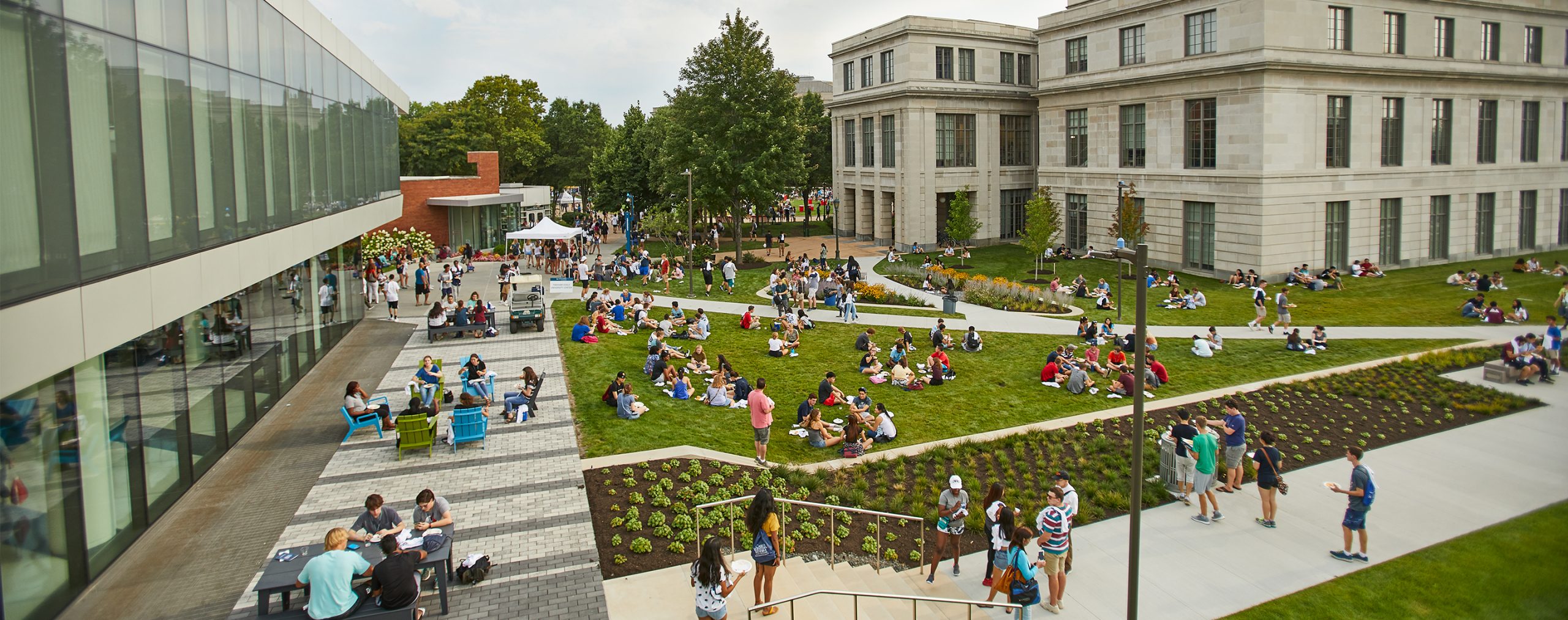The Mystery: Case Western Reserve University Acceptance Rate
Case Western Reserve University (CWRU) is a prestigious educational institution located in Cleveland, Ohio. Known for its strong academic programs and renowned faculty, CWRU attracts students from around the world. As a prospective student, understanding the acceptance rate at CWRU is crucial in assessing your chances of admission.
In this article, we will delve into the concept of acceptance rate and its significance in college admissions. We will then provide an in-depth profile of Case Western Reserve University, highlighting its academic programs and notable achievements. Finally, we will unveil the acceptance rate at CWRU, analyze its historical trends, and explore the factors that influence it.

Understanding Acceptance Rate
Acceptance rate refers to the percentage of applicants who are offered admission to an educational institution. It is an important factor for prospective students as it provides insight into the level of competition and selectivity of a university. A lower acceptance rate generally indicates a more competitive admissions process.
Several factors influence acceptance rates, including the number of applications received, the available spots in the incoming class, and the university’s desired student body composition. Acceptance rates can vary significantly across universities, with some highly selective institutions accepting only a small fraction of applicants.
Comparing acceptance rates across universities can help prospective students gauge their chances of admission and make informed decisions about where to apply. It is important to note that acceptance rates should not be the sole determinant of a student’s decision, as other factors such as academic fit, campus culture, and financial considerations also play a crucial role.
Case Western Reserve University: A Profile
Case Western Reserve University was founded in 1826 and has since established itself as a leading research institution. Located in the University Circle neighborhood of Cleveland, CWRU offers a wide range of undergraduate and graduate programs across various disciplines.
The university is renowned for its exceptional faculty who are experts in their respective fields. CWRU boasts several notable achievements, including being a member of the prestigious Association of American Universities (AAU) and consistently ranking among the top research universities in the United States.
With over 5,000 undergraduate students and a student-to-faculty ratio of 11:1, CWRU provides a supportive and engaging learning environment. The university offers a diverse range of academic programs, including majors in engineering, business, humanities, social sciences, natural sciences, and more.
Unveiling the Numbers: CWRU Acceptance Rate
The acceptance rate at Case Western Reserve University is an important statistic for prospective students to consider. It provides insight into the competitiveness of the admissions process and the likelihood of being admitted to the university.
The acceptance rate is calculated by dividing the number of admitted students by the total number of applicants. It is expressed as a percentage. At CWRU, this percentage has fluctuated over the years, reflecting changes in the applicant pool and the university’s enrollment goals.
Historically, the acceptance rate at CWRU has ranged from around 30% to 40%. This means that, on average, less than half of the applicants are offered admission. It is important to note that acceptance rates can vary by academic program and can be influenced by factors such as the number of available spots and the applicant pool’s qualifications.
When comparing CWRU’s acceptance rate with peer institutions, it is evident that CWRU is a highly selective university. However, it is important to consider the overall competitiveness of the university and the specific academic program of interest. Some programs within the university may have lower or higher acceptance rates depending on their level of demand and capacity.
Factors Influencing CWRU Acceptance Rate
Several factors contribute to the acceptance rate at Case Western Reserve University. Understanding these factors can provide insights into the university’s admissions process and help prospective students gauge their chances of admission.
One significant factor is the academic competitiveness and selectivity of CWRU. The university seeks to admit students who demonstrate strong academic abilities and have a track record of success. This includes considering factors such as high school GPA, class rank, and strength of curriculum.
Admission requirements and standardized tests also play a role in the acceptance rate. CWRU typically requires applicants to submit SAT or ACT scores, which are used to evaluate an applicant’s academic preparedness. While these scores are important, they are considered alongside other application materials to provide a holistic view of the applicant.
Demographic and geographic factors can also impact the acceptance rate. CWRU aims to create a diverse and inclusive student body and therefore considers factors such as geographic location and underrepresented populations in the admissions process.
Additionally, the university’s early decision and early action programs can influence the acceptance rate. These programs allow students to apply early and receive an admission decision sooner. Early decision is binding, meaning that if admitted, the student must attend CWRU. Early action is non-binding, allowing students to have more flexibility in their college decisions.
Overall, the acceptance rate at CWRU is influenced by a combination of academic competitiveness, admission requirements, demographic factors, and the university’s enrollment goals.
Beyond the Numbers: What Drives Acceptance Decisions at CWRU
While the acceptance rate at Case Western Reserve University provides an initial understanding of the competitiveness of the admissions process, it is important to recognize that admissions decisions at CWRU go beyond just numbers. The university follows a holistic review process, considering various factors to evaluate applicants.
One of the key elements of the holistic review process is the evaluation of an applicant’s academic achievements and potential. CWRU looks for students who have challenged themselves academically and have excelled in their coursework. This includes considering the rigor of the high school curriculum, grades, and the strength of letters of recommendation from teachers.
Essays play a significant role in the admissions process at CWRU. They provide an opportunity for applicants to showcase their personal experiences, goals, and aspirations. Admissions officers carefully read and evaluate essays to gain insights into an applicant’s character, values, and writing abilities.
Recommendation letters from teachers, counselors, or mentors are also considered in the holistic review process. These letters provide an external perspective on an applicant’s academic abilities, personal qualities, and potential for success at CWRU.
In addition to academic achievements and recommendation letters, extracurricular activities are taken into account. CWRU values students who have demonstrated involvement and leadership in extracurricular activities, such as clubs, sports, community service, or artistic pursuits. These activities showcase an applicant’s passion, dedication, and ability to contribute to the university community.
Demonstrated interest in CWRU is also considered in the admissions process. This includes attending information sessions, campus visits, and engaging with admissions representatives. While demonstrated interest is not a determining factor, it can positively influence an applicant’s chances of acceptance.
Finally, interviews may be conducted as part of the admissions process. These interviews provide an opportunity for applicants to further express their interests, goals, and fit with CWRU. While not all applicants are interviewed, those who are selected for an interview should prepare to articulate their strengths and aspirations.
It is important to note that the holistic review process at CWRU means that each application is evaluated in its entirety. Admissions officers consider the overall fit of an applicant with the university’s academic programs, campus culture, and values.
By considering a combination of academic achievements, essays, recommendation letters, extracurricular activities, demonstrated interest, and interviews, CWRU aims to select a diverse and talented incoming class of students who will contribute to the university community and thrive academically.
Frequently Asked Questions
What is the current acceptance rate at CWRU?
The current acceptance rate at Case Western Reserve University can vary from year to year. It is recommended to check the university’s official website or contact the admissions office for the most up-to-date information on the acceptance rate.
How has the acceptance rate changed over the past decade?
The acceptance rate at CWRU has experienced some fluctuations over the past decade. While specific historical data is not provided here, it is worth noting that acceptance rates can be influenced by various factors, including changes in the applicant pool, shifts in the university’s enrollment goals, and updates to the admissions process. To get a comprehensive understanding of the acceptance rate trends, it is advisable to consult official sources or reach out to the admissions office.
How does CWRU’s acceptance rate compare to other universities in the region?
CWRU’s acceptance rate can vary compared to other universities in the region. It is important to consider that acceptance rates can be influenced by factors such as the university’s selectivity, the competitiveness of the applicant pool, and the specific academic programs offered. Comparing acceptance rates across institutions can provide a general sense of competitiveness, but it is essential to research each university individually to understand their unique admissions processes and requirements.
Are there any specific academic requirements for admission to CWRU?
Case Western Reserve University considers various academic factors during the admissions process. While specific academic requirements may vary by program, CWRU generally looks for applicants who have completed a challenging high school curriculum, including advanced coursework in areas such as math, science, English, and social studies. It is recommended to review the university’s website or contact the admissions office for detailed information on the academic requirements for specific programs.
What standardized tests does CWRU consider for admission?
CWRU accepts both the SAT and ACT for admissions consideration. Applicants can choose to submit scores from either test, and the university does not have a preference for one over the other. It is important to note that standardized test scores are just one component of the holistic review process, and other factors, such as academic performance and extracurricular involvement, are also taken into account.
Does CWRU have any early decision or early action programs?
Yes, Case Western Reserve University offers both early decision and early action programs. The Early Decision program is binding, meaning that if a student is admitted, they are required to enroll at CWRU and withdraw applications from other institutions. The Early Action program is non-binding, allowing students to receive an early admission decision without the obligation to commit immediately. It is important to review the specific deadlines and requirements for each program on the university’s website.
How does CWRU evaluate applicants in the holistic review process?
In the holistic review process, CWRU evaluates applicants based on various factors, including academic achievements, essays, recommendation letters, extracurricular activities, demonstrated interest, and interviews (if conducted). Admissions officers consider the overall fit of an applicant with the university’s academic programs, campus culture, and values. Applicants need to present a well-rounded application that highlights their strengths, interests, and potential contributions to the CWRU community.
Are there any specific essay prompts for CWRU applications?
Case Western Reserve University typically provides essay prompts as part of the application process. These prompts may change from year to year, so applicants need to refer to the university’s website or application portal for the most up-to-date essay prompts. The essay prompts are designed to allow applicants to showcase their personal experiences, goals, and aspirations, and to provide insights into their character and writing abilities.
What role do recommendation letters play in the admission process?
Recommendation letters are an important component of the holistic review process at CWRU. These letters provide insights into an applicant’s academic abilities, personal qualities, and potential for success at the university. It is recommended that applicants choose recommenders who can speak to their strengths and accomplishments in an academic or extracurricular setting. It is important to select recommenders who know you well and can provide specific examples and anecdotes that highlight your abilities and potential.
How important are extracurricular activities in CWRU’s admission decisions?
Extracurricular activities play a significant role in CWRU’s admission decisions. The university values students who have demonstrated involvement and leadership in extracurricular pursuits, such as clubs, sports, community service, or artistic endeavors. These activities showcase an applicant’s passion, dedication, and ability to contribute to the university community. It is important to highlight your involvement and achievements in these areas in your application materials.
Does demonstrated interest or an interview impact the chances of acceptance at CWRU?
Demonstrated interest in CWRU can positively impact an applicant’s chances of acceptance. While it is not a determining factor, showing genuine interest in the university through activities such as campus visits, attending information sessions, or engaging with admissions representatives can demonstrate your enthusiasm and commitment to CWRU. Additionally, if selected for an interview, it provides an opportunity to further express your interest and showcase your fit with the university.
Are there any specific scholarships or financial aid opportunities for admitted students?
Case Western Reserve University offers a range of scholarships and financial aid opportunities for admitted students. These include merit-based scholarships, need-based grants, work-study programs, and loans. The university is committed to making education affordable and accessible to all students. It is recommended to explore the university’s financial aid website or contact the financial aid office for detailed information on the scholarships and financial aid opportunities available.
These frequently asked questions provide insights into various aspects of the admissions process at Case Western Reserve University. However, it is important to note that the admissions process and requirements may change over time. Therefore, it is always advisable to consult the official CWRU website or contact the admissions office for the most accurate and up-to-date information.
Conclusion
Understanding the acceptance rate at Case Western Reserve University is crucial for prospective students who are considering applying to the institution. The acceptance rate provides valuable insights into the competitiveness of the admissions process and can help students gauge their chances of admission.
In this article, we explored the concept of acceptance rate and its significance in college admissions. We provided a profile of Case Western Reserve University, highlighting its academic programs, renowned faculty, and notable achievements. We also delved into the acceptance rate at CWRU, discussing its historical trends and comparing it to peer institutions.
Furthermore, we examined the factors that influence the acceptance rate at CWRU, including academic competitiveness, admission requirements, demographic and geographic factors, and the impact of early decision and early action programs. We also went beyond the numbers and explored the holistic review process at CWRU, discussing the importance of essays, recommendation letters, extracurricular activities, demonstrated interest, and interviews.
By providing answers to frequently asked questions, we aimed to address common inquiries about the acceptance rate and admissions process at CWRU. However, prospective students need to conduct further research and visit the official CWRU website or contact the admissions office for the most accurate and up-to-date information.
Ultimately, understanding the acceptance rate and the factors that influence admissions decisions at Case Western Reserve University can help prospective students make informed choices about their college applications. It is important to consider a variety of factors, including academic fit, campus culture, financial considerations, and personal goals, when making decisions about higher education.
Case Western Reserve University offers a rich academic environment and a supportive community, attracting students from diverse backgrounds who are passionate about their fields of study. As you navigate the college admissions process, we encourage you to explore CWRU further and discover the opportunities it offers for your academic and personal growth.




